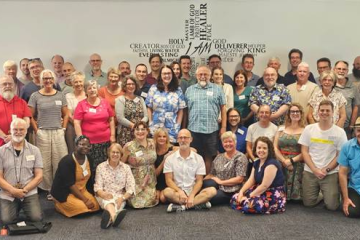Don’t waste a fight – Romans 13:8-10, Matthew 18:15-20
I may have given my punchline away with this image, but many years ago Aron and I attended a series of marriage enrichment dinners at our church (not this church) and we invited some friends – a couple many of you know – and at the start of the night, as an icebreaker exercise, we were asked to name a movie that bore some similarities with our relationship. And John Morrison said (because John and Kristine were the friends we had invited) and this was 2004, “Alien versus Predator!”
But the marriage enrichment session we were at was called ‘When you disagree…’ and it was about learning the skills, in your marriage and other areas of your life to fight well, and the expression that has stayed with me from that session was, “Don’t waste a fight!”
“Don’t waste a fight.” I tell this to every couple who comes to me for pre-marriage counselling! What this means is conflict and anger need to be addressed – not avoided. That conflict and anger are a way of expressing our deep feelings – of revealing who we are and what matters to us. And a way of learning to hear and understand another person’s perspective. In other words, fighting with one another – rather than a sign your relationship is falling apart – can be an opportunity for greater intimacy in a relationship – intimacy that means ‘into me see’ – which is why we should ‘not waste a fight’.
It can be! It can also, as we all know from painful experience, result in relationships being damaged or destroyed, which is why “don’t waste a fight” is about learning to fight well – to fight fair – to fight on the understanding that if only one of us wins, we both lose.
Sadly, this is something many of us don’t learn in our families of origin and sadly this is something many of us don’t learn in the church either. Episcopal priest and author, Barabara Brown Taylor writes, many families and churches are, “not schools in forbearance and forgiveness but reformatories where rules are more important than people and where the first rule is silence, silence about anything unpleasant or untoward. If you cannot say anything nice do not say anything at all, and if you have a problem with someone, keep it to yourself, because harmony – even the illusion of harmony – is the most important thing, more important than telling the truth, more important than your feelings, and more important, finally, than you.”
“Christians,” commentator Bill Loader writes, “have been particularly good at replacing honest open love with being nice….Talk to your panel of experts: they are sitting in the pews. We all share expertise in failure and success in these areas.”
So, I was thinking this week, about how we learn to fight well or to fight badly in our families of origin and in the church, and about talking to my panel of experts, so I did that and decided it was time for another game show! This time – can you guess which? Yes! Its Family Feud!
So I need eight volunteers – four from the right side of the congregation – we’ll call you the ‘Righty Family’ and four from the left – the ‘Wrongy?’ – no, it’s the ‘Lefty Family!’
OK, can I have _______ and _______ up here? Hopefully you know, roughly, how this works. I will ask a question and the team to press their buzzer first (these are your buzzers – you have to squeeze them) will have first opportunity to answer.
So, we went out to 100 of so people in the congregation of CBC (thank you so much to those who responded for your honesty and your wisdom!) and our top seven answers are on the scoreboard. Ready? “What is one unhealthy behaviour people in conflict in churches do?”
OK! Do we have ‘Gossip’ and ‘________________’ on the board? (Next slide)
I think this side was first, so we’ll go to you for more answers on the board.
______, “What is one unhealthy behaviour people in conflict in churches do?”
“Leave the church!”
Do we have ‘leave the church’ on the board? (Next slide)
OK, we do have some technical issues, so we might just get the answers and then show the scoreboard!
Rest of the answers…
All right, well its time to change it up now and play – not Family Feud but ‘Family of God!’ Lefty and Righty Families are you happy to stay and play this next game?
OK! Can I have ____________ and ____________ up here.
So, again we went out to 100 of so people in the congregation of CBC, and our top seven answers are on the scoreboard. Ready? “What is one healthy behaviour people in conflict in churches do?”
OK! Do we have ‘Talk ‘______’ on the board? (Next slide)
I think this side was first (both sides win?) so we’ll go to you for more answers on the board.
______, “What is one unhealthy behaviour people in conflict in churches do?”
“Listen to each other!”
Do we have ‘listen to each other’ on the board? (Next slide)
What’s that? Sorry! It seems we have more technical issues, so we might just get the answers again and then show the scoreboard!
Rest of the answers…
It was interesting to me how our answers lined up with the material I usually work through in pre-marriage counselling:
- Take time out (or even schedule a fight!)
- Use I statements – not you statements. “I feel devalued…when you…”
- Be specific. Not “you always…” but “this morning when you said this…” (Describe the specific behaviour without emotionally laden words.)
- And apologise and accept apologies. Genuinely. Keep building relationships where both parties win.
Can we thank our two families… You don’t win $20,000, sorry, but you can – when you put that last set of answers into action – win restored relationships.
You can. Yes, there are situations where speaking openly and praying and listening and valuing relationship and forgiving and all these things don’t result in restored relationships. Perhaps this is why Paul, the realist, but also the believer in genuine love, in our Romans 12 reading last week, says, “If it is possible, so far as it depends on you, live peaceably with all.”
But there are situations where good conflict resolution works! I am thinking about marriages I know that were really tenuous, but went through this process and are now healthy and lifegiving. I am thinking about Christian efforts in peacekeeping and reconciliation in places where situation have been fraught, but are now healthy and life-giving. I am thinking about relationships in this church that have been damaged, but have gone through processes like this – people just keeping on talking – and are now healthy and life-giving.
This Matthew reading is not a three-step process for kicking people out of the church – as we sometimes read it – but a three (or arguably four) step process for keeping people in – for restoring relationships!
There are situations – we should be wise about this – where there are big power imbalances and step one is not appropriate, but the passage says if step one doesn’t work, move onto step two, and if step two doesn’t work, move onto step three! Keep trying and keep trying and keep trying to talk to one another. Don’t sweep serious hurts and issues under the church carpet! Don’t say that the person who hurt me must make the first move. Just do it! Keep talking and keep listening because that is what healthy families, families that love and value each other do.
And that is what the family of God is intended to do! Here in this passage, there is even, as I said earlier, step 4: “let such a one be to you as a Gentile and tax collector.” Yes, these were the people outside the Jewish community, but Jesus’ ministry was to them! We are to treat offenders as Jesus did Gentiles and tax collectors – continuing to seek relationship – to offer love and forgiveness – to welcome people lavishly back to the family.
If you don’t believe me, look at the context of this passage. It’s preceded by the story of the lost sheep – of the shepherd who leaves the 99 behind to go after the one. We are to go after the one! And it’s followed by Jesus teaching that we are to forgive not seven times – but seventy times seven (or the NRSV also says 77 times which saves doing the math)! The point is, as Bill Loaders says, “Forgiveness is never to be abandoned.” And in the middle of these two stories, we’re told that in the church we must keep working things out. Keep fighting well. Because people matter. Family matters.
Family matters, it says, because the family of God is a tiny and imperfect and ‘work in progress’ version of God’s kingdom. “Truly I tell you,” Jesus says, “whatever you bind on earth will be bound in heaven and visa versa.” We need to keep binding unhealthy conflict responses – conflict that tears us apart – and keep loosing healthy conflict responses – healthy confrontation that deepens understanding. This is serious business. Let’s not waste a fight.
And family matters because the family that fights well together, that confronts in healthy ways together, that keeps going after the lost together, that forgives and forgives and forgives and forgives together, creates a place where God and God’s people stay together. “For where two or three are gathered in my name, I am there among them.”
God is here among us to help us be the family we are called to be. Can you join me, family of God, in our special family prayer?
Our Father in heaven,
hallowed be your name,
your kingdom come,
your will be done,
on earth as in heaven.
Give us today our daily bread.
Forgive us our sins
as we forgive those who sin against us.
Lead us not into temptation,
but deliver us from evil.
For the kingdom, the power, and the glory are yours
now and for ever. Amen.
Top seven answers on the board
- Gossip (11)
- Avoidance (10)
- Leave the church (6)
- Weaponize scripture (4)
- Skew the truth (3)
- Keep grudge (2)
- Exclude (1)
- Speak openly (12)
- Pray (6)
- Listen (5)
- Value the relationship (5)
- Forgive and work towards reconciliation (5)
- Recognise the limitations of what you know/acknowledge differences (3)
- Take a time out (1)


